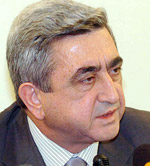Russians evaluate the recent Armenian parliamentary elections as the beginning of the process of transferring the post of president to current prime minister, Serge Sargsyan. Numerous Russian observers who were working on behalf of the CIS in Armenia have not recorded any violations and have evaluated the elections as exemplary. In fact, they were almost about to call on their foreign allies to consider that evaluation as a basis for their reports. This is a completely standardized attitude. Moscow benefits from the current situation in Armenia, the level of multilateral, interstate relations. So, why should they change anything?
It is not a fact at all that domestic reforms and changes in Armenia will lead to a new level of quality of Russian-Armenian relations, but actually the opposite. That does not fit in Moscow’s plans because it only has one predictable ally in the South Caucasus, Armenia.
Here is where it is necessary to search the motives of the announcements made recently by a couple of Armenian oppositionists who didn’t enter parliament. Those announcements seem awkward at first sight. Based on those announcements, the current authorities did everything to hurt Russian-Armenian relations, the current authorities are not the allies of Moscow, they prefer articulate slogans to real co-operation, etc. It is a simple calculation – the authors of similar announcements want to convince Moscow that they are more “pro-Russian” than the government and who knows, reach success in the upcoming presidential elections. They are also making such announcements to the West based on the same calculations.
However, that estimation was wrong from the start. The unstable situation in the South Caucasus is worrying the West. The reasons for this preoccupation are the three bloody conflicts, Azerbaijan’s autocratic regime, post-revolutionary Georgia’s ever-changing domestic situation, the low living standard in general, and that the enormous amounts of money provided by the West are not enough to raise the living standard. So, does the West need to see reforms in any of those countries? Not at all.
We already answered why Russia doesn’t need such changes in Armenia. In addition to that, Russia is neither hot nor cold with regards to the changes taking place in Armenia.
Shortly before the Armenian parliamentary elections, a “168 Hours” correspondent asked a top-ranking Russian Foreign Ministry government official whether Yerevan is worried that Moscow is in some way indifferent towards the events of May 12 (National Assembly elections) when the West has become considerably active, to which the government official responded by making a cynical comment about certain diplomatic announcements and said that whatever happens in Armenia during the elections, they won’t escape us [Russia]. I will leave it up to the reader’s interpretation. He probably meant that Armenia’s economy is dependent on Russia, the Karabakh issue remains, thousands of Armenians live in Russia, etc., and it is probably not worth waiting for Russia to support any one of the new presidential candidates in such conditions.
“The people of Armenia have enough will and sense to elect a president without the advice of others.”
That is why the Russian mass media was satisfied with the usual word combination for the 2007 Armenian parliamentary elections – “transfer of power”, specifically the transfer of power from Robert Kocharyan to Serge Sargsyan.

